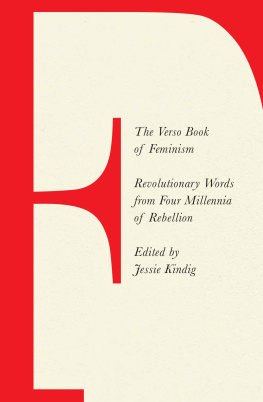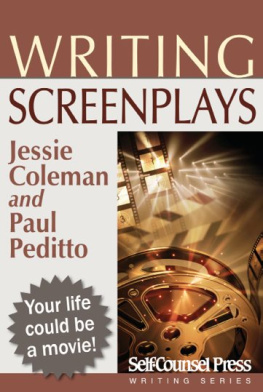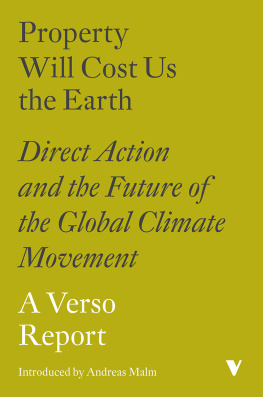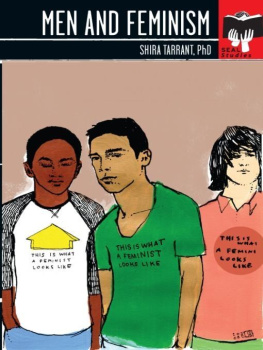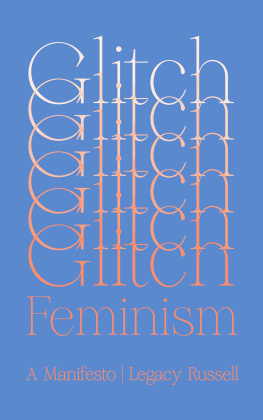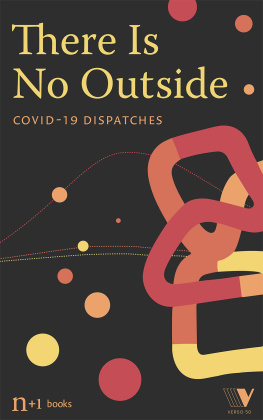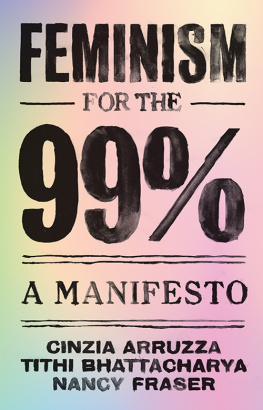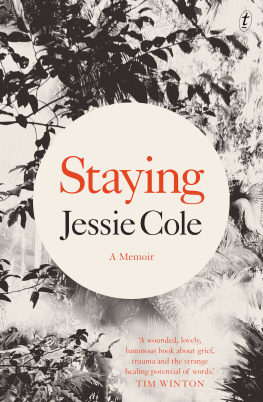Jessie Kindig - The Verso Book of Feminism
Here you can read online Jessie Kindig - The Verso Book of Feminism full text of the book (entire story) in english for free. Download pdf and epub, get meaning, cover and reviews about this ebook. publisher: Verso Books, genre: Romance novel. Description of the work, (preface) as well as reviews are available. Best literature library LitArk.com created for fans of good reading and offers a wide selection of genres:
Romance novel
Science fiction
Adventure
Detective
Science
History
Home and family
Prose
Art
Politics
Computer
Non-fiction
Religion
Business
Children
Humor
Choose a favorite category and find really read worthwhile books. Enjoy immersion in the world of imagination, feel the emotions of the characters or learn something new for yourself, make an fascinating discovery.
- Book:The Verso Book of Feminism
- Author:
- Publisher:Verso Books
- Genre:
- Rating:4 / 5
- Favourites:Add to favourites
- Your mark:
- 80
- 1
- 2
- 3
- 4
- 5
The Verso Book of Feminism: summary, description and annotation
We offer to read an annotation, description, summary or preface (depends on what the author of the book "The Verso Book of Feminism" wrote himself). If you haven't found the necessary information about the book — write in the comments, we will try to find it.
The Verso Book of Feminism — read online for free the complete book (whole text) full work
Below is the text of the book, divided by pages. System saving the place of the last page read, allows you to conveniently read the book "The Verso Book of Feminism" online for free, without having to search again every time where you left off. Put a bookmark, and you can go to the page where you finished reading at any time.
Font size:
Interval:
Bookmark:





THE VERSO BOOK OF FEMINISM
THE VERSO BOOK OF FEMINISM
Revolutionary Words from
Four Millennia of Rebellion
Edited by Jessie Kindig
with Sophia Giovannitti, Charlotte Heltai, and Rosie Warren

First published by Verso 2020
Collection Verso 2020
Contributions The contributors 2020
Introduction Jessie Kindig 2020
All rights reserved
The moral rights of the authors have been asserted
1 3 5 7 9 10 8 6 4 2
Verso
UK: 6 Meard Street, London W1F 0EG
US: 20 Jay Street, Suite 1010, Brooklyn, NY 11201
versobooks.com
Verso is the imprint of New Left Books
ISBN-13: 978-1-78873-926-9
ISBN-13: 978-1-78873-980-1 (US EBK)
ISBN-13: 978-1-78873-927-6 (UK EBK)
British Library Cataloguing in Publication Data
A catalogue record for this book is available from the British Library
Library of Congress Cataloging-in-Publication Data
A catalog record for this book is available from the Library of Congress
Typeset in Bembo by Hewer Text UK Ltd, Edinburgh
Printed and bound by CPI Group (UK) Ltd, Croydon CR0 4YY
For all those whose voices and actions were ignored or never recorded,
and whose writing was never published.
You will never be silent.
CONTENTS
INTRODUCTION:
WE BEGIN WITH WHAT IS NOT YET COMPLETE
Feminism is unfinished business.
The reasons it is unfinished are legion: political, economic, social, experiential, having to do with violence and race and capital, families and states and empires, sexuality and reproduction and the actions of men. It is unfinished because gender is still a reason to be killed, harmed, denied, exploited. But there is one more reason: feminism is unfinished because it is the work of imagination.
Feminism is a politics of emancipation, and the first thing needed for such a politics is to see the need for one. For women to begin advocating for themselves meant an imagining of women together as a collective force. To call yourself a feminist is to insist on connecting your life to others, and that was and still is a political act.
For example: in 1892, African American scholar and educator Anna Julia Cooper wrote in A Voice from the South,
Only the BLACK WOMAN can say when and where I enter, in the quiet, undisputed dignity of my womanhood, without violence and without suing or special patronage, then and there the whole Negro race enters with me.
Cooper spoke in the first person I but also adamantly in the we of black womanhood, crediting the first editions authorship to A Black Woman of the South. Her chargethat liberation was truest when entered into with those who were most marginalwas also a challenge to her audience. She asked of us to follow her I in order to make a we.
Two decades later, in the first womens literary journal in Japan, Seit, Yosano Akiko argued that claiming the I was a revolutionary act in a society where women were seen as inferior. That is, claiming the I could tell about the conditions of the we:
I desire to write entirely in the first person.
I who am a woman.
I desire to write entirely in the first person.
I. I.
One century later, the Tamil and Dalit poet Sukirtharani spoke both for herself and all those living at the frayed edges of societies and towns. In her 2012 poem A faint smell of meat, the poets I blends into her we:
In their minds
I, who smell faintly of meat,
my house where bones hang
stripped entirely of flesh,
and my street
where young men wander without restraint
making loud music
from coconut shells strung with skin
are all at the furthest point of our town.
But I, I keep assuring them
we stand at the forefront.
The productive tension between the I and the webetween the personal and the political, between the social expectations given and the life one lives, between articulating experience and claiming political voiceis the driving struggle and foundational act of feminist practice.
As this book shows, this is a practice enacted again and again around the world, often in tandem with other movements of revolutionary change: during wars for empire and territory, Europes waves of revolution, the abolitionist struggle against slavery, the spread of capitalist modernity across the globe, workers battles for labor rights, the post-colonial independence movements in the Global South, the black freedom struggle in the United States, the rise of the digital age. Modern Western feminism is often historicized as a series of waves, from the first wave of womens suffrage and abolition activism in the nineteenth and early twentieth centuries to the second wave of the 1960s to 70s that took up harassment and rape, marriage and abortion, lesbianism and sexual double standards. The 1990s and 2000s brought the third wave, with its reclamation of sex and its insistence on diversity and individual empowerment, and now we are said to be in a fourth wave fueled by technology, the #MeToo movement, intersectionality, and trans politics. Historically speaking, these definitions are about as useful as they are incomplete, but the metaphor is instructive: waves keep breaking upon the shore.
Because feminist politics coalesces around bodies forced into a hierarchy of gender and sex, part of the work of feminism is also to imagine a future when the idea of woman as an oppressed group no longer needs to exist. That is, feminism sets out to destroy the conditions of its own emergence. As the Argentinian feminist movement Ni Una Menos put it, as their call for a womens strike spread across Latin America and the world in 2017: We organize to change everything.
Feminism as a term didnt come into common English usage until the 1910s, a particularly revolutionary worldview born out of the womens movement of the nineteenth century and the battle for suffrage. The word was first included in the Oxford English Dictionary in 1933 and defined legally: the advocacy for womens rights.
In making selections for this book, Ive understood feminism to be the twinning of the self to the collective, from exploring what it is to inhabit a gendered body to breaking apart the idea of woman altogether. Youll see myths of female power as well as calls for legal reforms, private musings alongside revolutionary theory. Since part of feminist practice as I understand it is to transform a world that wants to minimize you, you will also hear from women not talking about women and feminism at all but instead conducting scientific experiments, fighting racial violence, struggling for national independence or socialism or communism, fighting apartheid, discovering comets, forming workplace unions, making art. All of these practices are, to my mind, part of the feminist work of expanding the scope of the world.
Font size:
Interval:
Bookmark:
Similar books «The Verso Book of Feminism»
Look at similar books to The Verso Book of Feminism. We have selected literature similar in name and meaning in the hope of providing readers with more options to find new, interesting, not yet read works.
Discussion, reviews of the book The Verso Book of Feminism and just readers' own opinions. Leave your comments, write what you think about the work, its meaning or the main characters. Specify what exactly you liked and what you didn't like, and why you think so.

